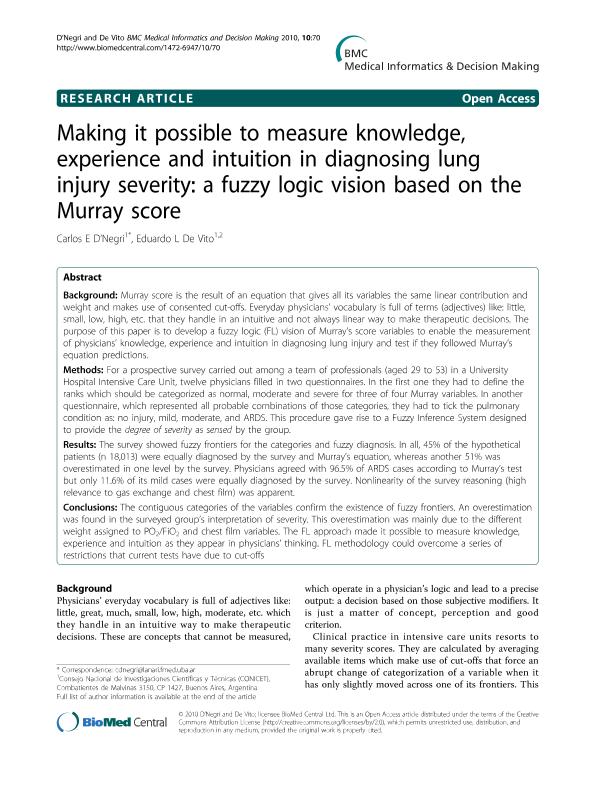Mostrar el registro sencillo del ítem
dc.contributor.author
D'negri, Carlos Eduardo

dc.contributor.author
de Vito, Eduardo

dc.date.available
2019-01-07T21:20:07Z
dc.date.issued
2010-11
dc.identifier.citation
D'negri, Carlos Eduardo; de Vito, Eduardo; Making it possible to measure knowledge, experience and intuition in diagnosing lung injury severity: A fuzzy logic vision based on the Murray score; BioMed Central; Bmc Medical Informatics And Decision Making; 10; 1; 11-2010; 1-11
dc.identifier.issn
1472-6947
dc.identifier.uri
http://hdl.handle.net/11336/67632
dc.description.abstract
Background. Murray score is the result of an equation that gives all its variables the same linear contribution and weight and makes use of consented cut-offs. Everyday physicians' vocabulary is full of terms (adjectives) like: little, small, low, high, etc. that they handle in an intuitive and not always linear way to make therapeutic decisions. The purpose of this paper is to develop a fuzzy logic (FL) vision of Murray's score variables to enable the measurement of physicians' knowledge, experience and intuition in diagnosing lung injury and test if they followed Murray's equation predictions. Methods. For a prospective survey carried out among a team of professionals (aged 29 to 53) in a University Hospital Intensive Care Unit, twelve physicians filled in two questionnaires. In the first one they had to define the ranks which should be categorized as normal, moderate and severe for three of four Murray variables. In another questionnaire, which represented all probable combinations of those categories, they had to tick the pulmonary condition as: no injury, mild, moderate, and ARDS. This procedure gave rise to a Fuzzy Inference System designed to provide the degree of severity as sensed by the group. Results. The survey showed fuzzy frontiers for the categories and fuzzy diagnosis. In all, 45% of the hypothetical patients (n 18,013) were equally diagnosed by the survey and Murray's equation, whereas another 51% was overestimated in one level by the survey. Physicians agreed with 96.5% of ARDS cases according to Murray's test but only 11.6% of its mild cases were equally diagnosed by the survey. Nonlinearity of the survey reasoning (high relevance to gas exchange and chest film) was apparent. Conclusions. The contiguous categories of the variables confirm the existence of fuzzy frontiers. An overestimation was found in the surveyed group's interpretation of severity. This overestimation was mainly due to the different weight assigned to PO2/FiO2and chest film variables. The FL approach made it possible to measure knowledge, experience and intuition as they appear in physicians' thinking. FL methodology could overcome a series of restrictions that current tests have due to cut-offs. © 2010 D'Negri and De Vito; licensee BioMed Central Ltd.
dc.format
application/pdf
dc.language.iso
eng
dc.publisher
BioMed Central

dc.rights
info:eu-repo/semantics/openAccess
dc.rights.uri
https://creativecommons.org/licenses/by-nc-sa/2.5/ar/
dc.subject
Ards
dc.subject
Fuzzy Logic
dc.subject.classification
Medicina Critica y de Emergencia

dc.subject.classification
Medicina Clínica

dc.subject.classification
CIENCIAS MÉDICAS Y DE LA SALUD

dc.title
Making it possible to measure knowledge, experience and intuition in diagnosing lung injury severity: A fuzzy logic vision based on the Murray score
dc.type
info:eu-repo/semantics/article
dc.type
info:ar-repo/semantics/artículo
dc.type
info:eu-repo/semantics/publishedVersion
dc.date.updated
2019-01-07T13:55:09Z
dc.journal.volume
10
dc.journal.number
1
dc.journal.pagination
1-11
dc.journal.pais
Reino Unido

dc.journal.ciudad
Londres
dc.description.fil
Fil: D'negri, Carlos Eduardo. Consejo Nacional de Investigaciones Científicas y Técnicas; Argentina
dc.description.fil
Fil: de Vito, Eduardo. Consejo Nacional de Investigaciones Científicas y Técnicas; Argentina. Universidad de Buenos Aires. Facultad de Medicina. Instituto de Investigaciones Médicas; Argentina
dc.journal.title
Bmc Medical Informatics And Decision Making

dc.relation.alternativeid
info:eu-repo/semantics/altIdentifier/url/https://bmcmedinformdecismak.biomedcentral.com/articles/10.1186/1472-6947-10-70
dc.relation.alternativeid
info:eu-repo/semantics/altIdentifier/doi/https://doi.org/10.1186/1472-6947-10-70
Archivos asociados
